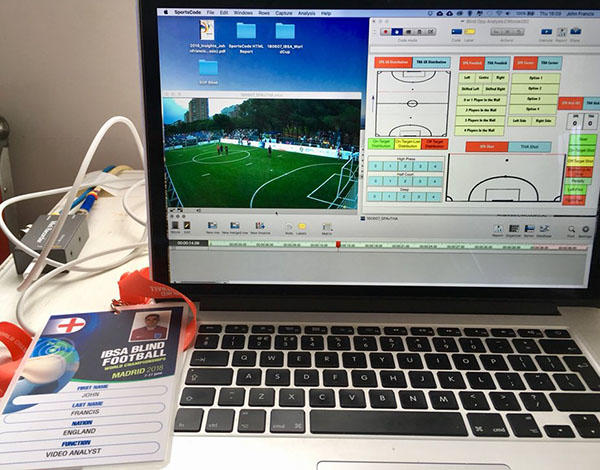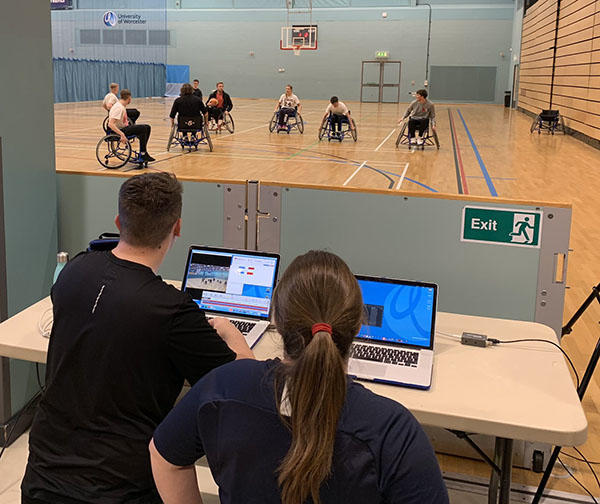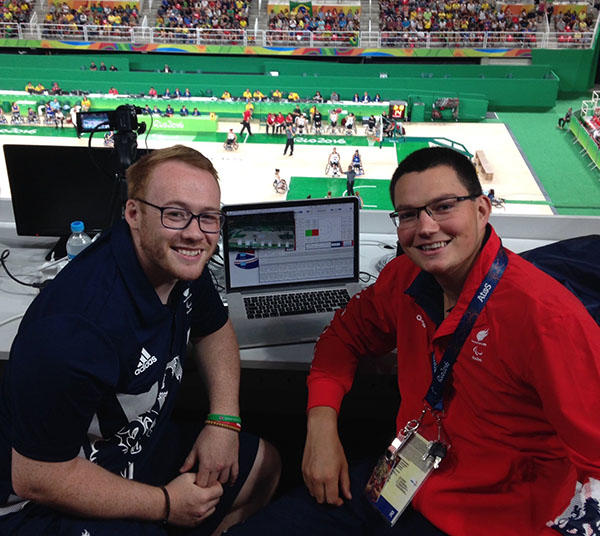Sports performance analysts are now employed by virtually every professional club and major sporting team to provide coaches, athletes and other support staff with objective data to aid in improving sporting performance. In this blog
Dr John Francis, Course Leader for
Applied Sports Performance Analysis MSc, discusses how analysts can change the future of sport.
After a sport-filled summer with the Olympic Games in Tokyo, the European Football Championships, the British and Irish Lions tour of South Africa, the Tour de France and the Wimbledon Championship, there is one more major sporting international competition that we've been waiting for; the re-arranged 2020 Paralympic Games. What all of these competitions, and the athletes that compete in them, have in common, is there is a large support network of individual’s working behind the scenes ensuring they can assist the athletes to achieve their true potential. One of the increasingly utilised support networks is the use of sports performance analysis and the employment of performance analysts.
Sports performance analysis and the role of the analyst

Nowadays when watching sport, either live or on television, you will spot individuals with a laptop sitting either in the stands or by the side of the coaching team. These individuals, known as performance analysts, are collecting specific information and data from footage regarding the individual, the team’s, and typically the opponent’s technical and/or tactical actions and behaviour. This is then used by the coach and other support staff to aid in the evaluation of performances and provide accurate feedback to help inform future decision making.
One of the main reasons for the increase in the use of sports performance analysis and the employment of performance analysts is due to limitations in the ability of humans to recall key information. Previous research has highlighted coaches are only able to accurately recall 59.2% (SD±15.3) of critical events during games, potentially resulting in the athlete receiving biased feedback (Laird and Waters, 2008). Therefore, through the information and data collected by the performance analyst, coaches, athletes and other members of support staff are provided with objective and unbiased information, which can be used to inform decision making and enhance future performance.
Helping individuals and teams prepare and review performances
Sport performance analysis is now viewed by athletes and coaches to be an essential tool as part of their preparations; informing aspects that need correcting, reinforcing aspects of positive play, and helping to prepare for upcoming games. Recently, in collaboration with another university, I explored how the use of sports performance analysis information and data was used by deaf international athletes to inform their practice (de Martin Silva and Francis, 2021).
Through uploading footage, data and information to an online platform, the deaf athletes were able to reflect on aspects of play away from training, generate an understanding of what upcoming training would entail and work collaboratively to generate a style of play and game plans for upcoming games. This online provision worked alongside in-person sessions to maximise the limited time when the team trained together and helped them prepare for games. The athletes not only felt they had a connected learning approach, offering opportunities before, during and after sessions to engage in further discussion and consolidate their learning through the objective feedback but also felt they had a greater sense of being part of a team. Through engaging with and using sports performance analysis, not only were performance improvements seen, due to increased tactical decision-making, but there was also a personal growth of athletes and staff.
Predicting future performances

Whilst the information collected by performance analysts can be used to reflect on current or previous performances, it is becoming more widely used to look further ahead at what the best athletes and teams in the world are currently doing and what they may do in the future. This approach and the insights generated by the performance analyst, enable coaches and athletes to change how they prepare for future competitions.
Within men’s elite wheelchair basketball, we have created a series of predictive models to better understand the key tactical components for team success (Francis, Owen and Peters, 2019) and field-goal success (Francis, Owen and Peters, 2021) based on performances in 2015 and 2016. We found classification and the combination of athletes coaches use during games has a significant effect on the game outcome. Whilst coaches have traditionally used three of the least impaired players (known as high-point players who are classified as either 4.0 or 4.5) and two of the most impaired players (known as low-point players and are classified as either 1.0 or 1.5) to stay within the 14-point classification rules for each team, our models showed using more mid-point players (players who are classified as either 2.0, 2.5, 3.0 or 3.5) was likely to improve a team’s overall chances of winning a game. It was interesting that in 2017, 2018 and 2019 team’s that used this line-up at major men’s wheelchair basketball tournaments finished higher in the final tournament standings. We will be monitoring whether this trend is also observed during the men’s tournament at the 2020 Paralympic Games or whether any female teams adopt this tactic.

Our shooting model also produced some interesting evidence to help teams. This highlighted that when players take a shot from near the basket, the right-hand-side elbow or either base-lines they had a higher chance of shooting success. Their likelihood of being successful was also increased when teams passed the ball amongst teammates before shooting. Through moving the ball several times before shooting, the defence has to adjust potentially leaving a space or area on the court free for an athlete to shoot. In a similar manner, it will be interesting to see where and how shots are taken from during the current tournament or whether individuals’ default to driving into the key and taking shots under pressure.
So, whilst you are avidly watching the Paralympics or any major sporting event, it can be useful to remember that all of the athletes will have a team working behind them. Along with physiotherapists, coaches, doctors and lawyers, sports performance analysts make up a key part of an entourage designed to improve and refine sporting performance. By analysing tactics, evaluating data and offering an objective view of past performances, using state-of-the-art technology, analysts can shape the future of elite level sport and sporting achievements worldwide.
References
Francis, J. W., Owen, A. J. and Peters, D. M. (2021) “Predicting field-goal success according to offensive, defensive and contextual variables in elite men’s wheelchair basketball,” PLOS ONE. Edited by J. Sampaio, 16(1), p. e0244257. doi: 10.1371/journal.pone.0244257.
Francis, J. W., Owen, A. and Peters, Derek. M. (2019) “Making every ‘point’ count: Identifying the key determinants of team success in elite men’s wheelchair basketball,” Frontiers in Psychology, 10(1431), pp. 1–14. doi: 10.3389/FPSYG.2019.01431.
Laird, P. and Waters, L. (2008) “Eyewitness recollection of sports coaches,” International Journal of Performance Analysis in Sport, 8(1), pp. 76–84. doi: 10.1080/24748668.2008.11868424.
de Martin Silva, L. and Francis, J. W. (2021) “‘It Is Like a Little Journey’: Deaf International Futsal Players’ and Coaches’ Experiences in Collaborative Blended Learning,” International Sport Coaching Journal, 8(2), pp. 183–196. doi: 10.1123/iscj.2019-0101.
Dr John Francis has an array of applied and research experience in performance analysis with elite able-bodied and disabled sports teams. John is the principal lecturer on the MSc Sport (Applied Performance Analysis) and has provided support to a variety of teams during six European Championships, three World Championships, one World Cup and a Paralympic Games.